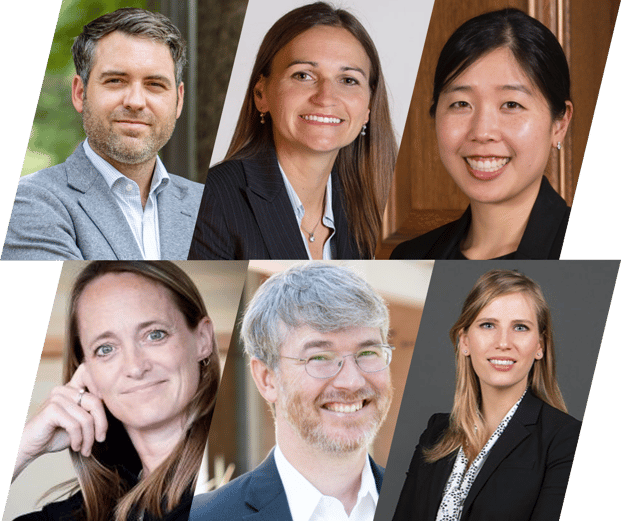TEXAS A&M LAW HOSTS FIFTH ANNUAL ENVIROSCHMOOZE TO GROWING SUCCESS
Texas A&M School of Law’s Energy, Environmental & Natural Resources Law Program held its fifth “EnviroSchmooze” workshop virtually on August 26. The virtual event provided an intimate forum for legal scholars across the country to share their work and receive feedback from their esteemed peers. The guests invited to this year’s event included: Caroline Cecot, Assistant Professor of Law at Antonin Scalia Law School; Karrigan Bork, Acting Professor of Law at University of California, Davis; Hajin Kim, Assistant Professor of Law at University of Chicago Law School; Cherie Metcalf, Associate Professor at Queen’s University, Canada; and Amy Stein, Professor of Law at University of Florida College of Law. Daniel Walters, Associate Professor of Law at Texas A&M School of Law also presented in the program. Participants from Texas A&M School of Law included: Professors Vanessa Casado Perez, Gabriel Eckstein, Felix Mormann, and Timothy Mulvaney.

First to showcase their research in the workshop was Professor Hajin Kim who presented her preliminary work on how fines and punishments, when presented in the aggregate, can affect people’s reactions to the punishment differently than when presented in a per-unit frame. Collaborating with Simone Tang of Cornell University and Genevieve Helleringer of the University of OXford, Professor Kim noted that their study suggests that discussing punishment in the aggregate results in people being more likely to trust and keep incumbent regulators, less likely to seek further punishment, and less likely to require bad actors to change their operations.
Professor Caroline Cecot presented next, discussing her work on “Efficiency and Equity in Regulation.” Professor Cecot’s research challenges the efficiency versus equity framework that has shaped how presidential administrations govern the Executive Branch and their implementation of regulations. She argues that instead of the view that benefit distributions can only either be efficient or equitable, but not both, the implementation of neutral procedures such as cost-benefit analysis could provide a framework in which both may be achieved. She used environmental issues to demonstrate her argument. Professor Cecot said that she updated her article based on the feedback she received at the workshop, which she noted “really sharpened her work.” Professor Cecot added, “the conference was a great accomplishment because it was a zoom meeting that was actually fun.”
Following a break for lunch, Texas A&M Law Professor Daniel Walters presented his work, developed in collaboration with Hannah Wiseman of Penn State University, on “Self-Regulation in the Cradle: The Case of the Emerging Hydrogen Economy.” In the piece, Walters and Wiseman explore the nascent hydrogen economy in order “to shed light on the theory of self-regulation and how it applies in the context of an especially technical, emergent, networked, and urgently needed industry.” The goal of the project is to examine how self-regulation may enable or stifle innovation and coordinated scaling in emerging industries like the hydrogen economy. One of the chief lessons emerging from the study is the need to develop standards at the commercialization stage, in large part, because the hydrogen industry is a technical, networked industry that the public perceives to be high risk.
Next on the agenda was Professor Karrigan Bork, who presented his work on “Water Rights Extractions.” In that project, Professor Bork argues that water rights in the United States are inadequately managed, leading to excessive externalities in the form of economically inefficient water use, over consumption of water, and the subsequent loss of the goods and services provided by the current water systems. In order to reduce the burden these externalities impose on the public, Bork proposes to apply exactions (a policy most often associated with land use changes) to water rights permitting as a means of mitigating the shortcomings effectuated by current practices. He suggests that doing so will “internalize the public costs of water withdrawals and restore some much-needed rationality to water use decisions.”
Professor Amy L. Stein followed Professor Bork with a discussion of her draft article on “Regulated Data Monopolies.” In her work, Professor Stein explores options for reducing the concentration of data, and subsequent power held by a few private entities. She presents the argument for allowing private entities to collect and analyze data in ways that will enhance their product, while sharing the benefit with those whose data is being used in such efforts. Stein uses electric utilities, the archetypal government-regulated monopoly, to demonstrate the value of personal data, the risks of expanding protections for private entities in obtaining such data without requiring some form of benefit sharing with the public, and an application of the framework. She asserts that her analysis presents an approach that allows utilities to continue capitalizing on consumer data while enhancing electric grid options and compensating consumers for the use of their data.
Closing out the workshop, Professor Cherie Metcalf presented her work on “Communicating Risk across the Political Divide.” The piece, co-authored with Professor Johnathan Nash of Emery University, provides an empirical analysis on how channels of communication can affect the perceived trust, credibility, and persuasiveness of information about current risks such as, climate change, vaccine safety, and other issues. Surveying individuals in both Canada and the United States, among other conclusions, the study finds that “independent agencies constructed to be apolitical sources of expertise are perceived as more trustworthy and accurate than political actors.”
The unique and intimate nature of the EnviroSchmooze workshop allowed academics from across the country to exchange feedback on all of the works-in-progress presented in the program. The format also created a comfortable, energizing, and supportive environment that facilitated both camaraderie and constructive discussions and advice. Having completed five successful EnviroSchmooze workshops in a row, the program clearly is now a regular fixture of the law school’s Energy, Environmental & Natural Resources Law Program and is emblematic of legal scholarship at Texas A&M School of Law.